Jumping into her striped pink pajamas, Juliet, a 7-year-old transgender girl, snuggles next to her mom on her bed as they talk about everything from video games, to transition, to life in their Eastside apartment. Above them, Juliet’s twin brother, Keegan, holds tightly onto his father on the top bunk of the bunk beds in their shared room.
The twins’ room has a large framed Super Mario Bros. poster; dinosaur toys and action figures are scattered on the floor. They also share a walk-in closet partly filled with some of Juliet’s strawberry-themed dresses and accessories.
Around this time last year, the twins and their parents Susan and Brian were fleeing Austin, Texas, to protect Juliet from a wave of anti-trans laws and policies in the state. To protect their privacy, the parents asked that the family’s last name be withheld, and that pseudonyms be used for their children to avoid transphobia and harassment.
A year later, the family feels safer living in a state with strong protections for LGBTQ+ people. In the Pacific Northwest, Susan and Brian say they’ve found freedom and joy, safety for Juliet and Keegan and even some room for Brian to explore his own gender identity.
But they’re still adjusting to the life they’re building in Washington after leaving Texas, their home for over two decades. They’re now living on a single income, in a state more expensive than the one they moved from, and rebuilding their lives while far away from loved ones, including Susan’s twin sister.
Yet, despite the difficulties the move has presented, it was all worth it, the family says. For Susan and Brian especially, it’s worth the emotional security that comes with knowing that Juliet and Keegan can’t be taken away from them just because one of the twins is trans.
“I was just haunted by it and still am,” Susan said. “I get tears in my throat just talking about it even though I know we’re safe.”
The family is not alone.
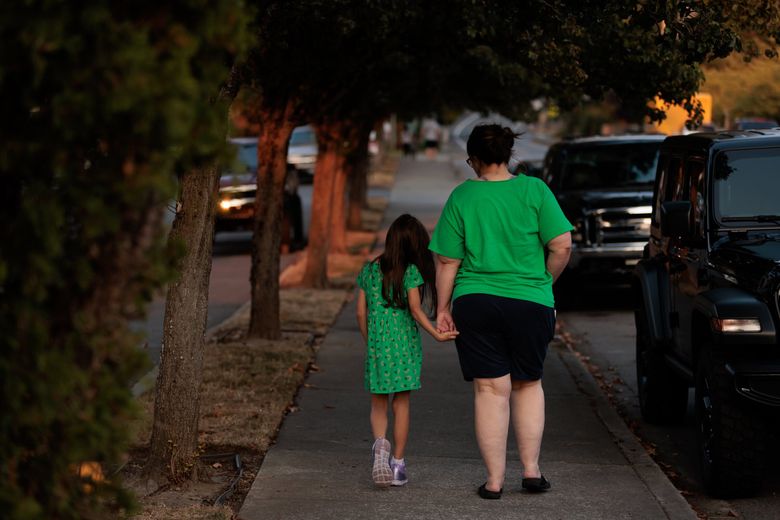
Nearly 500 anti-LGBTQ+ bills have been introduced in state legislatures in 2023, spanning issues of education, health care access and public accommodations. Nearly all of the bills targeted the rights of transgender people.
As of March, approximately 144,500 transgender youth nationally have lost access or are at risk of losing access to gender-affirming care due to pending legislation, according to a report from the Williams Institute at the UCLA School of Law. More than a quarter of trans adults say they have moved to a different place for acceptance, according to a survey by KFF and The Washington Post.
In Susan and Brian’s home state of Texas, Gov. Greg Abbott called on “members of the general public” and “licensed professionals” in February 2022 to report parents of trans children to state authorities on any suspicion that they are receiving gender-affirming health care.
This followed a legal opinion by Texas Attorney General Ken Paxton that classified providing trans youth with transition-related treatment as child abuse. That care may include puberty blockers, a reversible medication that delays unwanted physical changes, hormone therapy and some surgeries.
When Texas started investigating parents of trans kids, Susan and Brian decided to take action.
Although they lived in Austin, a traditionally more progressive part of Texas, Susan still feared someone might report them to authorities if they knew Juliet was trans.
“I was already making escape plans in my head,” Susan said. “They want to say that affirming your kid is abuse, but the only way that anyone would ever convince my daughter to go by a boy’s name, use male pronouns, dress like a boy would be to literally torture her.”
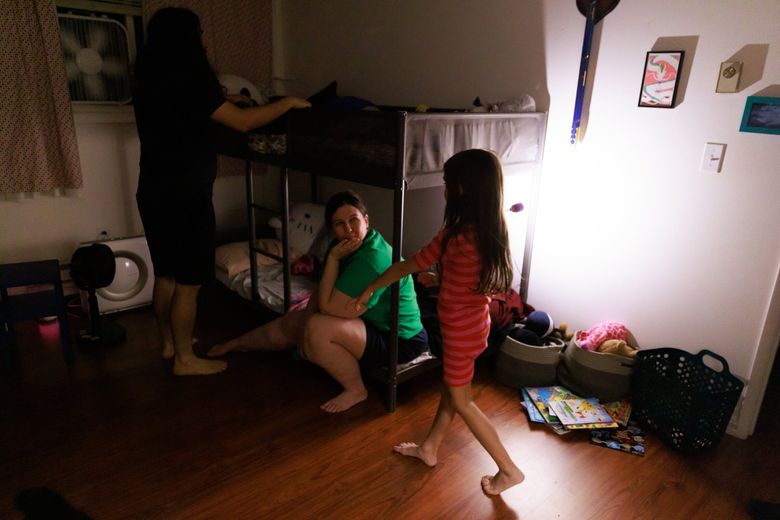
Coming out as a trans girl
Juliet started exploring her gender identity as a toddler by wearing princess dresses and growing out her hair. In 2019, 3-year-old Juliet told her mother, “I am a girl person, can I be your daughter?” In the years after coming out, Juliet began using she/her pronouns and picked out a new name.
While Juliet is too young to medically transition, she has socially and legally transitioned by changing her gender expression, and amending her legal name and gender marker on most of her official documents. According to the World Professional Association for Transgender Health, this type of gender-affirming care is appropriate given that she has not reached puberty.
Major health organizations, including WPATH, oppose bans on trans health care for trans youth. They have deemed trans health care “medically necessary” to alleviate symptoms of gender dysphoria, a persistent distress due to the mismatch between a person’s sex assigned at birth and gender identity.
At the time, Susan never imagined that Juliet’s trans identity would put her in jeopardy of being taken away from her parents. Then came 2022, when Texas’ anti-trans policies began feeling like a real threat to the family staying together.
Lying awake in her bed at night, Susan feared someone ripping her children out of her arms and forcibly placing them into the foster care system.
“We couldn’t live like that anymore,” Susan said.
Susan’s mounting stress and anxiety affected her sleep, concentration and ability to eat.
Watching Susan spiral under the stress that came with worrying about Juliet was also distressing for her twin sister, Karen, who also asked that her last name be withheld to protect her niece.
“She was incredibly frayed and worn down by it,” Karen said. “She was always glued to the news … it was depleting her.”
Family life in Austin
Susan, a social science researcher, and Brian, a school teacher, had made a life for themselves over two decades in Austin. By the time the twins were born in 2016, they had a strong family network around them that included Susan’s twin and best friend, Karen.
When the twins were toddlers, Karen would read them stories, pick up their favorite takeout treats and step in as a second caretaker if Brian was running late coming home from a school meeting.
Like their mother and aunt, Juliet and Keegan are close, but they went through some bumpy spots when Juliet first came out as transgender. Keegan struggled at first to use her correct name but then quickly it became, “the most natural thing in the world,” Susan said.
Once, while riding in their car seats back in Texas, Keegan held his sister’s hand and told her, “Juliet, I’m always going to try hard to make your dreams come true.”
Though her brother may not know as much as she does about trans people, Juliet knows he still cares.
“He said he ‘would be on my side with trans stuff,’” Juliet said. “That made me feel like I had my whole family on my side, not just my parents.”
But by 2022, because of all the anti-trans policies being introduced in Texas, the family no longer felt like they belonged.
“It doesn’t feel good when your home state is making it so clear that they don’t want you,” Susan said. “It was like the conservatives decided to go for the jugular.”
But the move wasn’t easy. Juliet was initially so sad and frustrated about having to leave the only state she had ever known as home that she told her parents, “Just let them hurt me.”
“There were a lot of things I liked about Texas so it was hard to leave,” Juliet said, but, “I didn’t want to get separated from my family.”
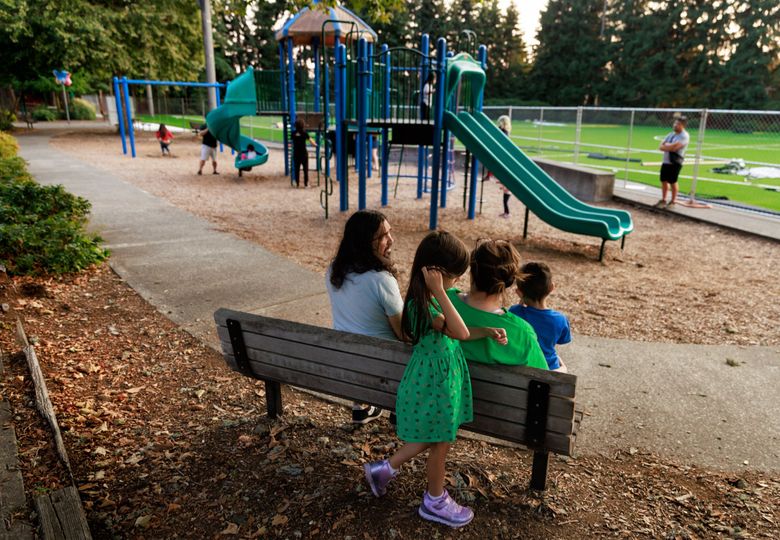
Moving to Washington
When researching new places to live, the family scanned the Erin in the Morning newsletter, which maps areas at risk of passing anti-trans laws. California and New York were marked as safe places, but too expensive for the family’s budget.
The couple chose Washington because of its LGBTQ+ inclusive nondiscrimination laws, which include robust protections for transgender people. This includes the Washington Law Against Discrimination, which prohibits discriminating against LGBTQ+ people based on their gender expression or identity at work, school or when seeking housing. Health insurance in Washington also must cover gender-affirming care.
The big move finally happened last August when Brian was offered a teaching job at a large public school district in Western Washington. Shortly thereafter, they packed up their car and a rental truck and headed northwest. Landing in Washington four days later felt freeing.
To support their move to the Seattle area, the family used $20,000 in savings they had set aside for a downpayment on a house, and raised a little over $17,000 through a GoFundMe.
During “Meet the Teacher” night at the kids’ school last fall, Susan nervously greeted Juliet and Keegan’s new first grade teacher. She teared up when she saw a Black Lives Matter mug on the teacher’s desk. That message — one limited by some school districts in their home state — was a “we’re not in Texas anymore” moment.
“In Texas, you can get fired,” Susan said. “You had to self-censor.”
Shortly after seeing the mug, Susan opened up to the teacher about how the family had fled Texas to protect their trans daughter. The teacher was empathetic and reassured Susan she respected and would affirm Juliet.
“What we got was more than what we dared and hoped for in Texas,” Susan said. “Even in the supposed liberal oasis of Austin.”
Living in a state more welcoming toward LGBTQ+ people was liberating for the family.
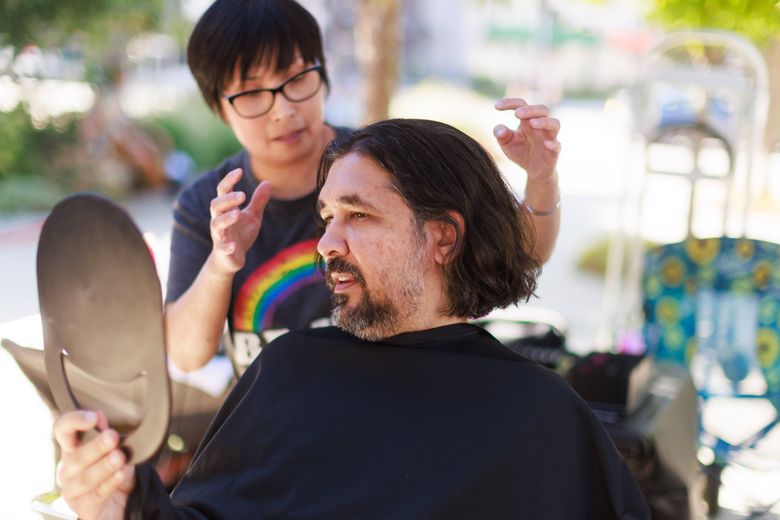
A year into their new life on the Eastside, Brian came out as nonbinary — something he never would have felt comfortable doing as a teacher in Texas.
“I didn’t realize I needed a piece of what Juliet needed,” Brian said. “Now, I’m here. I would not want to live anywhere else.”
After Brian came out to his immediate family, a weight was lifted off his shoulders — literally. They’re now visibly “more relaxed” Susan says.
Juliet came out at school, too. After a lesson about civil rights leaders, she told her classmates that she is transgender. Not everyone knew what “transgender” meant and asked Juliet questions during recess.
“I was revealing my identity to people who don’t know about it much,” Juliet said. “It felt embarrassing and kind of scary.”
Ultimately, Juliet is happy she told her story at school. For her, opening up to her peers marked progress from the start of the school year when she and Keegan “were some of the only friends we could play with.”
Much gained, much lost
Living in a safer place has alleviated a lot of the family’s stress, despite personal and financial costs.
“I breathe easier,” Brian said. “I hope [my kids] know their safety and happiness matters so much and it’s worth it to me.”
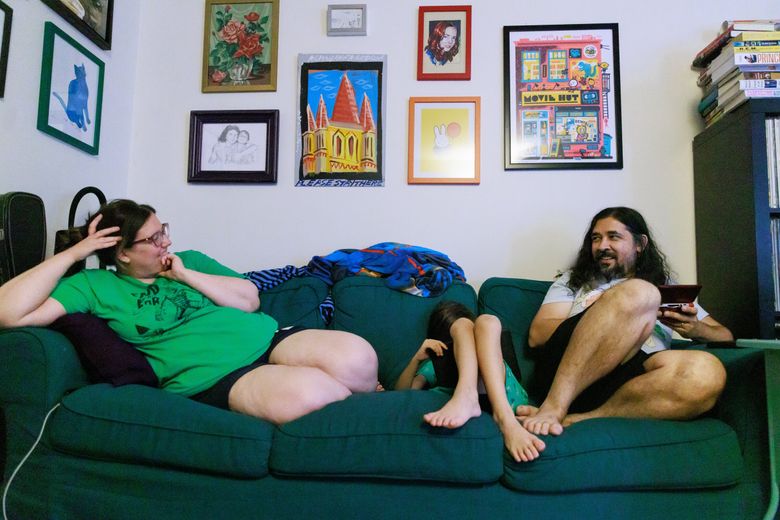
With Susan unable to find work since leaving Texas, the family has lived off Brian’s school teacher income while renting a two-bedroom apartment on the Eastside. In Austin, they rented a similarly sized apartment that was about $400 cheaper than their Eastside rent.
But there are many things they miss about their previous home — meals at their favorite Tex-Mex spots like Mi Madre’s, wandering through vintage record stores, Juliet’s favorite ice cream spot, Andy’s Frozen Custard, and playing at the twins’ favorite park, Little Walnut Creek.
For Susan, the hardest part was leaving her twin sister, Karen.
“If I could get back anything from Austin, she’s at the top of the list,” she said. “We always say she’s like the honorary third parent.”
Karen is just relieved that Susan is in a safer space.
While their relationship can be complicated, there’s also “nobody else in your life who’s going to be even close to that,” Karen says of her relationship with her twin.
Yet, even though things are better in Washington, Susan and Brian said they still face transphobia in different ways and have had to navigate delays with accessing support for their daughter’s transition.
Juliet’s first primary care provider in the Seattle area declined to provide the family a letter in support of her legal transition, saying, in part, that the issue fell outside the scope of their practice.
While the family eventually received a letter from another doctor in Seattle, Susan said it was an exhausting process. In May, a Texas court granted Juliet’s name change and gender marker change.
To celebrate, the parents wrote their daughter’s chosen name in ketchup on a plate with french fries.
“She smiled so big,” Susan said.
Establishing roots in a sanctuary for trans people
In a year that has seen a wave of anti-trans legislation being introduced all over the country, Washington has doubled down on its protections for trans people.
In April, the state enacted a “shield law” to protect access to gender-affirming care for people seeking refuge here. None of three anti-trans bills Republican lawmakers introduced moved out of committee.
According to the nonprofit advocacy group Lavender Rights Project, there is no data available on the numbers of families of trans youth fleeing other states for Washington.
Jaelynn Scott, executive director of the Lavender Rights Project, said some families are moving to Washington because of the LGBTQ+ protections in the state, and the organization predicts that an uptick in anti-trans rhetoric and legislation will likely bring an “influx of trans refugees from other states.”
“Legislators were very intentional about making sure that Washington was affirmed as a place of sanctuary for trans people,” Scott said.
Without the threat of an investigation in Texas or cross-country move this past summer, Juliet and Keegan could focus on being kids. They battled each other in Pokémon video games, raced their scooters, and tossed Frisbees with Brian at the park. The family likes going to shows at the Beacon Cinema and enjoys slurping chocolate milkshakes and fries from a family-owned burger shop. While the move brought the family closer, without child care or a large support network around, Susan and Brian don’t get much alone time as a couple.
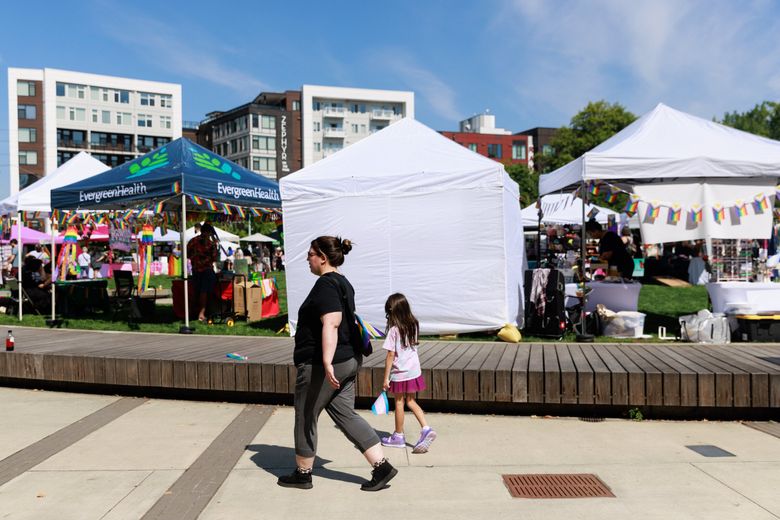
As the sun beamed down on the family at Redmond Pride this month, they sat on a park bench twirling rainbow and trans pride flags. While Keegan and Brian browsed vendor booths, Juliet stayed safely cuddled in her mother’s arms, sporting a T-shirt that read: “Trans Rights are Human Rights.”
Looking at a sea of LGBTQ+ people that filled the park brought up bittersweet reminders of Austin, the city they’d fled. Still, Susan feels comfort in knowing that her children have found a new city to call home.
“Keeping my kids safe and being able to have them with me is worth anything,” Susan said. “I want them to internalize that idea of pride … being proud of who you are no matter what people think.”

"freedom" - Google News
September 16, 2023 at 08:00PM
https://ift.tt/kAPi4xD
Family finds freedom, joy in WA after fleeing anti-trans legislation in Texas - The Seattle Times
"freedom" - Google News
https://ift.tt/fNtpo5w
https://ift.tt/oGWvKVi
Bagikan Berita Ini














0 Response to "Family finds freedom, joy in WA after fleeing anti-trans legislation in Texas - The Seattle Times"
Post a Comment